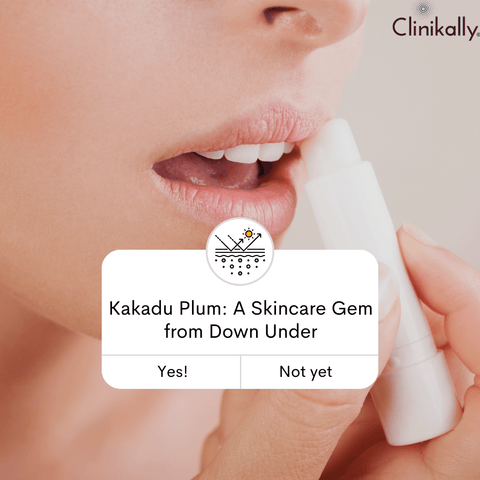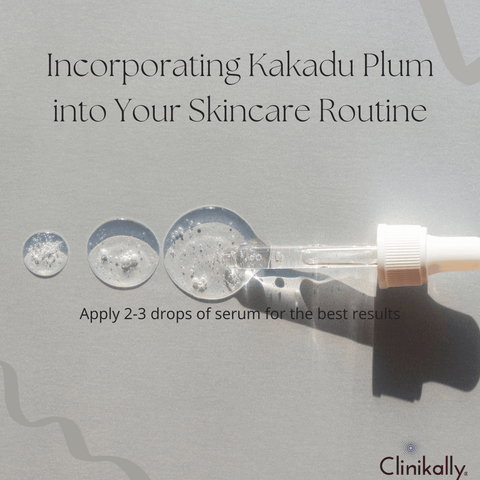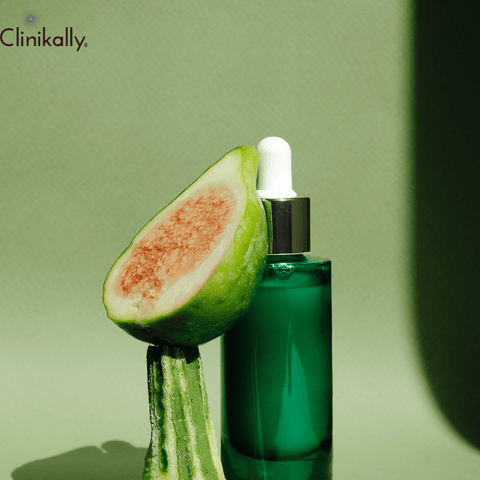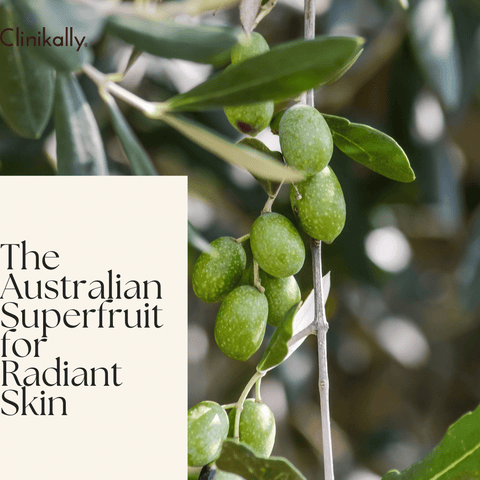Kakadu plum (Terminalia ferdinandiana), commonly known as Gubinge or Billygoat Plum, is a native Australian fruit recognised for its strong skincare benefits. It is regarded as one of the richest natural sources of vitamin C, with up to 100 times the vitamin C content of oranges. Because of this distinguishing feature, Kakadu Plum is an effective skincare ally. Because of the fruit's numerous benefits, skincare products containing Kakadu plum extracts, such as serums, moisturisers, masks, and creams, have grown in popularity. When utilising Kakadu plum skincare products, it is critical to follow the product directions and incorporate them into a well-rounded skincare program. It is important to note, however, that no single substance can address all skin issues. Consider utilising a combination of products that fit your unique skin type and issues, as well as maintaining a healthy lifestyle, being hydrated, and protecting your skin from excessive sun exposure, for best results.
Kakadu Plum: A Skincare Gem from Down Under

Absolutely! Kakadu plum, commonly known as the "Skincare Gem from Down Under," is a fascinating natural ingredient that has gained attention and respect in the world of beauty and skincare. This distinctive Australian fruit, indigenous to the Northern Territory and Western Australia, boasts extraordinary qualities that make it a sought-after skincare ally. Because of its numerous benefits, skincare products using Kakadu plum extract or oil have grown in popularity. Serums, moisturisers, face masks, toners, and even lip balms are among the goods available. As with any skincare ingredient, be sure the product composition is appropriate for your skin type and issues. Before using Kakadu plum-based products on your skin, perform a patch test to see if you have any specific skin issues or allergies.
Unveiling the Kakadu Plum
The Kakadu plum is a remarkable and unusual Australian fruit noted for its great health benefits and exceptional nutritional composition. Some of the important characteristics that distinguish the Kakadu plum include its origin and habitat, physical beauty, a nutritional powerhouse, historic indigenous use, current applications, sustainable harvesting, and culinary use. The Kakadu plum is gaining popularity and recognition in the worldwide arena as the world becomes more aware of its outstanding attributes. The Kakadu plum continues to amaze and captivate people with its extraordinary characteristics, from its traditional use by Indigenous Australians to its current applications in skincare and food.
Nutritional Profile of the Kakadu Plum
The Kakadu plum (Terminalia ferdinandiana) has an impressive nutritional profile, making it one of the most nutrient-dense fruits in the world. This distinctive Australian fruit is high in vitamins, minerals, antioxidants, and other beneficial compounds. The following is a list of the key nutrients found in Kakadu plum:
-
Vitamin C: Kakadu plum is well-known for its high vitamin C content, which acts as a powerful antioxidant. It has up to 100 times the vitamin C content of oranges. The best Vitamin C serum for your skin type can help you improve immune function, collagen synthesis, and skin protection from environmental damage.
-
Vitamin E: Vitamin E is another powerful antioxidant found in Kakadu plum. It protects the body's cells from oxidative stress and aids in the maintenance of healthy skin and hair.
-
Vitamin A: Kakadu plum is high in vitamin A, which is necessary for vision, immune function, and the maintenance of healthy skin and mucous membranes.
-
Folate: Folate, also referred to as vitamin B9, is essential for DNA synthesis and cell division. During periods of rapid growth and development, it is especially crucial.
-
Vitamin K: The vitamin K found in kakadu plums is essential for healthy blood clotting and bones.
-
Dietary Fibre: This fruit has a lot of dietary fibre, which is good for your digestion and keeps your cholesterol levels in check.
-
Minerals: The kakadu plum contains a number of minerals, including zinc, iron, calcium, magnesium, potassium, and calcium. These minerals are essential for many physiological functions, including nerve health, bone density, and enzyme activity.
-
Gallic Acid: Gallic acid, a phenolic substance found in Kakadu plums, has anti-inflammatory and antioxidant properties.
-
Ellagic Acid: This polyphenol, which is present in Kakadu plums, has been linked to potential anticancer effects and might support the antioxidant effects of the fruit.
-
Flavonoids: Flavonoids are plant compounds with anti-inflammatory and antioxidant properties, and the kakadu plum contains them.
The Skincare Benefits of Kakadu Plum

Because of its numerous skin advantages, Kakadu Plum is regarded as a skincare superhero. Its outstanding nutritional profile, which is high in vitamin C and antioxidants, makes it an effective ally for a variety of skin issues. Here are some of Kakadu Plum's skincare benefits:
-
Powerful Antioxidant Protection: Kakadu plum is one of nature's finest sources of vitamin C, a potent antioxidant. Antioxidants aid in the neutralisation of free radicals, which are unstable chemicals that can cause oxidative stress and skin cell damage. Kakadu plum helps prevent premature aging by protecting the skin from environmental aggressors, such as fine lines, wrinkles, and dullness.
-
Boosts Collagen Production: Vitamin C is required for collagen synthesis, the protein that keeps skin elasticity and firmness. Regular use of Kakadu plum in skincare can help support collagen production, resulting in smoother, more youthful-looking skin.
-
Skin Brightening and Even-Tone: Kakadu plum's high vitamin C content can help brighten the skin and promote an even skin tone. It reduces melanin production, which causes dark spots, hyperpigmentation, and uneven skin tone, resulting in a more radiant complexion.
-
Hydration and moisturization: Kakadu plum contains a variety of essential nutrients that aid in skin hydration. Skin that has been properly moisturised appears plumper and more supple, which helps to reduce the appearance of fine lines and wrinkles.
-
Anti-Inflammatory and Soothing: Kakadu plum's natural anti-inflammatory properties make it ideal for soothing irritated or sensitive skin. It is especially beneficial for those who suffer from acne, rosacea, or redness.
-
UV Protection: While it should not be used in place of sunscreen, the presence of antioxidants such as vitamin C in Kakadu plum may provide some protection against UV-induced skin damage caused by the sun's harmful rays.
-
Nourishment and Revitalization: Kakadu plum's abundance of vitamins and minerals nourish the skin, promoting overall skin health and vitality.
-
Skin Repair and Regeneration: Kakadu plum's antioxidant content aids in the repair and regeneration of skin cells, promoting a more resilient and rejuvenated complexion.
-
Benefits of Anti-Aging: The combination of antioxidant protection, collagen support, and skin brightening properties helps combat aging signs such as fine lines, wrinkles, and age spots.
-
Suitable for All Skin Types: Kakadu plum is generally well-tolerated by all skin types, including sensitive skin, making it a versatile and inclusive ingredient for skincare products.
Packed with Antioxidants: Fighting Free Radicals
Indeed, Kakadu plum is high in antioxidants, making it an effective anti-free radical weapon. Free radicals, which are unstable molecules with unpaired electrons, are neutralised by antioxidants. When free radicals build up in the body as a result of environmental factors such as pollution, UV radiation, smoking, and stress, they can induce oxidative stress and harm cells, including skin cells. This oxidative stress is a major contributor to a variety of health problems, such as skin aging, inflammation, and chronic diseases. Kakadu plum antioxidants, including vitamin C, vitamin E, and different polyphenols, play an important role in protecting the skin and body from free radical damage. Here's how they can assist:
-
Neutralise Free Radicals: Antioxidants are electron donors, and they neutralise free radicals by providing them with the electron they lack. By doing so, antioxidants prevent free radicals from stealing electrons from healthy cells, halting the chain reaction of cell damage.
-
Skin Protection: Antioxidants in Kakadu plum, when applied topically, can help protect the skin from external stressors such as pollution and UV radiation. They act as an additional line of defence against the damaging effects of these environmental aggressors.
-
Support for Collagen: Free radicals can harm collagen, the structural protein that gives skin its firmness and elasticity. Antioxidants, such as vitamin C, aid in the preservation of collagen, resulting in a more youthful appearance.
-
Skin Brightening: Antioxidants that inhibit melanin production can help brighten the skin and even out skin tone, reducing the appearance of dark spots and hyperpigmentation.
-
Anti-Inflammatory Properties: Kakadu plum antioxidants have anti-inflammatory properties that can soothe and calm irritated or inflamed skin.
-
Enhancing Skin's Natural Defence System: Antioxidants work to fortify the skin's natural defence system by lowering oxidative stress, which supports the skin's capacity for repair and regeneration.
The Role of Vitamin C in Skincare
Vitamin C is an essential element in skincare and is regarded as one of the most effective and versatile. Its potent antioxidant qualities make it a superhero when it comes to promoting healthy, glowing skin. The following are the primary functions of vitamin C in skincare:
-
Antioxidant Protection: Vitamin C is a powerful antioxidant that aids in the neutralisation of free radicals, which are unstable molecules that can cause oxidative stress and damage to skin cells. Vitamin C, by combating free radicals, helps to prevent premature aging, such as fine lines, wrinkles, and dark spots.
-
Collagen Synthesis: Vitamin C is required for the production of collagen, a protein that gives the skin structure and elasticity. Collagen production naturally declines with age, which causes sagging and a loss of firmness. By supporting collagen synthesis, vitamin C helps maintain skin's suppleness and youthfulness.
-
Skin Brightening: Vitamin C inhibits the enzyme that produces melanin, which can cause dark spots and hyperpigmentation. The use of vitamin C in skincare on a regular basis can help brighten the skin and promote a more even skin tone.
-
Sun Damage Protection: While vitamin C should not be used in place of sunscreen, it can enhance the benefits of sunscreen. When combined with sunscreen, vitamin C provides additional protection against the sun's harmful rays and sun-induced skin damage.
-
Reducing Inflammation: Anti-inflammatory properties of vitamin C can soothe and calm irritated or inflamed skin. This makes it ideal for people with sensitive or acne-prone skin.
-
Enhancing Skin Repair: Vitamin C promotes wound healing and the natural repair process of the skin. It can help reduce the appearance of scars and promote a smoother complexion.
-
Skin Hydration: As a water-soluble vitamin, vitamin C aids in the binding of water to the skin, resulting in improved skin hydration and moisture retention.
-
Increasing the Effectiveness of Other Skincare Ingredients: When used in combination, vitamin C can increase the effectiveness of other skincare ingredients such as vitamin E and sunscreen.
Anti-Inflammatory and Hydrating Properties
Indeed, Kakadu plum has anti-inflammatory as well as hydrating properties, making it an important ingredient in skincare products. These characteristics contribute to its ability to promote healthy, balanced, and radiant skin.
-
Anti-Inflammatory Properties: Kakadu plum contains natural anti-inflammatory compounds such as polyphenols and vitamin C, which help to reduce inflammation and soothe irritated skin. Inflammation is a common skin problem associated with acne, rosacea, and sensitivity. By including Kakadu plum in your skincare routine, you can help to calm and relieve redness and irritation, resulting in a more comfortable and balanced complexion.
-
Hydration and moisturization: Kakadu plum contains essential nutrients and minerals that aid in skin hydration. It aids in the retention of moisture in the skin, resulting in better skin texture and suppleness. Skin that is well-hydrated appears plumper and younger, and it can also help reduce the appearance of fine lines and wrinkles. The hydrating qualities of Kakadu plum make it a fantastic ingredient for promoting general skin health.
Consider skincare products containing Kakadu plum extract or oil for their anti-inflammatory and moisturising properties. This ingredient can be especially effective in serums, moisturisers, masks, and creams for individuals with sensitive skin or looking for relief from dryness and irritation. It is critical to remember that skincare is not a one-size-fits-all solution and that individual skin types and issues differ. Before applying it to your full face, as with any new skincare product, perform a patch test to check for any adverse reactions, especially if you have sensitive skin or known allergies.
Incorporating Kakadu Plum into Your Skincare Routine

Given the numerous skincare benefits of Kakadu plum, incorporating it into your skincare routine can be a rewarding experience. Here are some tips for incorporating Kakadu Plum into your daily routine:
-
Patch Test: A patch test is required before introducing any new skincare product. Apply a small amount of the Kakadu plum-based product to the inner forearm or behind the ear. Wait 24 hours to see if any negative reactions, such as redness, itching, or irritation, occur. If there are no negative reactions, you can use the product.
-
Cleansing: Begin your routine with a gentle cleanser that is appropriate for your skin type. Cleansing removes dirt, impurities, and makeup from your skin, preparing it for the next steps.
-
Toner (Optional): If you use a toner, select one that is appropriate for your skin type and concerns. A hydrating or soothing toner can be beneficial, particularly if you have dry or sensitive skin.
-
Vitamin C Serum with Kakadu Plum: Using a vitamin C serum containing Kakadu plum extract or oil is the foundation for incorporating Kakadu plum into your routine. Apply a few drops of the serum to your cleansed face and neck. Allow it to absorb completely by gently massaging it into your skin.
-
Moisturiser with Kakadu Plum: After applying the vitamin C serum, apply a moisturiser containing Kakadu plum. This will increase the fruit's hydrating and nourishing properties.
-
Sunscreen: Because vitamin C can make the skin more sensitive to the sun, it is critical to wear sunscreen during the day. Choose a broad-spectrum sunscreen with at least SPF 30 and apply it as the final step in your morning skincare routine.
-
Nighttime Routine: If you have a separate nighttime routine, Kakadu plum products can be incorporated in the same way. Remember to cleanse first, then apply the vitamin C serum and finish with a nighttime moisturiser.
-
Weekly Treatment: If you have a Kakadu plum-infused mask or treatment, use it once or twice a week to give your skin an antioxidant and hydration boost.
-
Consistency: The foundation of any skincare regimen is consistency. Utilise Kakadu plum products frequently to reap all of their advantages, and watch as your skin gradually gets better.
-
Adjust as Necessary: Keep an eye on how the products are responding to your skin and adjust as necessary. If you experience any irritation or sensitivity, reduce the frequency of use or consult dermatologists online.
Topical Applications of Kakadu Plum
Because of the fruit's exceptional nutritional profile and skincare benefits, topical applications of Kakadu plum have grown in popularity in the skincare industry. The following are some of the ways Kakadu plum is used in topical skincare products:
-
Vitamin C Serums: Due to their high vitamin C content, Kakadu plums are a popular ingredient in vitamin C serums. These serums are light and easily absorbed, and they help to brighten the skin, even out skin tone, and protect it from environmental damage.
-
Moisturisers and Creams: Kakadu plum is frequently incorporated into moisturisers and creams to provide hydration and nourishment to the skin. These products aid in the retention of moisture, resulting in smoother and more supple skin.
-
Face Masks: Kakadu plum can also be found in face masks, which provide a concentrated boost of antioxidants and hydration. These masks are especially beneficial for revitalising and radiating the skin.
-
Eye Creams: Kakadu plum eye creams can help reduce the appearance of dark circles and puffiness while also providing antioxidant protection to the delicate skin around the eyes.
-
Facial Oils: Kakadu plum can be found in facial oils that are high in essential fatty acids and antioxidants. These oils hydrate and revitalise the skin, leaving it soft and glowing.
-
Toners and mists: Kakadu plum extract is used in some toners and mists to provide a refreshing and hydrating boost to the skin.
-
Serums for Specific Concerns: Kakadu plum is also combined with other active ingredients to address specific skin concerns such as anti-aging serums, brightening serums, and acne-fighting serums.
Incorporating Kakadu Plum in Your Diet
Incorporating Kakadu plums into your diet can be both delicious and nutritious. However, due to their short shelf life and limited distribution, fresh Kakadu plums may not be widely available outside of Australia. Nonetheless, you can experience the benefits of Kakadu plum in other ways, such as through numerous Kakadu plum products and supplements. Here are some ideas for using Kakadu plum in your diet:
-
Kakadu Plum Powder: Kakadu plum powder is made by freeze-drying or dehydrating the fruit in order to preserve its nutritional content. The Kakadu plum powder can be added to yoghurt, oatmeal, salad dressings, and desserts.
-
Kakadu Plum Extract or Juice: Look for Kakadu plum extracts or juices, which can be mixed into water, herbal teas, or used in sauces, dressings, and marinades.
-
Kakadu Plum Supplements: If fresh Kakadu plums or products are not available in your area, you can look into Kakadu plum supplements in capsule or powdered form. Before introducing any new supplements into your diet, consult with a healthcare professional.
-
Kakadu Plum-Infused Products: Some food companies make jams, chutneys, sauces, and syrups that are infused with Kakadu plum and can be used as condiments or toppings.
-
Kakadu Plum-Infused Desserts: For a unique and tasty treat, look for Kakadu plum-infused chocolates, cakes, or biscuits.
-
Kakadu Plum Tea: Kakadu plum tea is another option to explore. Look for teas that contain Kakadu plum or use Kakadu plum extract to add a zesty and refreshing flavor to your beverages.
Understanding the Safety and Sustainability Aspects

Understanding the safety and sustainability characteristics of any ingredient, including Kakadu plum, is essential for responsible use and ethical consumption. Here's what you should be aware of:
Safety:
-
Allergies and Sensitivities: While Kakadu plum is generally safe for most people, some people are allergic or sensitive to specific fruits. If you have known allergies to similar fruits or plants, conduct a patch test before using Kakadu plum-based products on your face or body.
-
Skincare Product Formulation: When using skincare products that contain Kakadu plum, read the entire ingredient list. Some products may contain additives that can cause allergic reactions. If you have sensitive skin or specific skin concerns, look for products with clean formulations and seek personalised advice from a dermatologist.
-
Sun Sensitivity: While vitamin C in Kakadu plums provides some sun protection, it is not a replacement for sunscreen. Continue to use sunscreen as part of your daily skincare routine to protect your skin from harmful UV rays.
Sustainability:
-
Harvesting Methods: Indigenous Australian communities, which frequently have inherited knowledge of sustainable harvesting techniques, are the main harvesters of the Kakadu plum. Support the communities involved in the cultivation of Kakadu plum and the products that use it to ensure sustainability.
-
Wild Harvesting: The Kakadu plum is a wild-harvested fruit, and excessive harvesting may have an adverse effect on the species' population. Sustainable harvesting methods put an emphasis on preserving the population's health to ensure its longevity.
-
Conservation: In order to guarantee the survival of the Kakadu plum and biodiversity, some organisations and initiatives work to conserve and protect the species' native habitat.
-
Certifications: Look for skincare or food products with sustainability certifications, such as those indicating fair trade practises or environmentally friendly sourcing.
-
Responsibility: As consumers, we can be responsible by purchasing products from companies that prioritise sustainability and ethical sourcing. Being mindful of our consumption and reducing waste also contribute to a more sustainable approach.
Making informed decisions about the products you buy and consume requires research. Ask the company or brand about its sustainability policies and dedication to ethical sourcing if you have any doubts.
Considerations for Safe Use
When incorporating Kakadu plum or Kakadu plum-based products into your skincare routine, there are several considerations for safe use to ensure a positive and beneficial experience: patch test, suitability for your skin type, the concentration of kakadu plum, sun sensitivity, combining products, product expiry date, consistency and patience, allergies and sensitivities, hygiene and storage. It is recommended to consult dermatologists in India before using skincare products. By following these guidelines and paying attention to your skin's reaction, you can safely incorporate Kakadu plum into your skincare routine. If you experience persistent irritation or adverse reactions, stop using the product and seek professional help.
Sustainability and Ethical Harvesting
When using any natural component, like Kakadu plum, sustainability, and ethical harvesting are critical considerations. As the demand for Kakadu plum increases, it is critical that its sourcing and harvesting practises are environmentally responsible and respectful of the communities involved. Take a look at the following:
-
Indigenous Involvement: Kakadu plum is an important part of Indigenous Australian culture, and Indigenous communities have harvested and used it sustainably for thousands of years. Supporting Indigenous participation and traditional knowledge in Kakadu plum harvesting and processing is critical for its long-term management.
-
Sustainable Wild Harvesting: Kakadu plum is primarily wild-harvested, which means it grows naturally in its native habitat. Sustainable wild harvesting entails practises that protect the wild plant population's long-term health. This could include limiting the amount harvested, allowing plants to regenerate naturally, and avoiding over-harvesting.
-
Biodiversity Conservation: Ensuring the conservation of the natural habitat of Kakadu plum is vital for preserving biodiversity. Sustainable harvesting practises must consider the overall ecosystem's impact and work to protect the plant's native environment.
-
Fair Trade and Ethical Sourcing: When purchasing Kakadu plum products, look for brands that follow fair trade practises and ethical sourcing. Supporting businesses that value ethical worker treatment and fair compensation for farmers and harvesters is critical for promoting sustainability.
-
Certification: Some products may bear certifications indicating sustainable and ethical sourcing practises. Look for Fair Trade, Rainforest Alliance, or other similar certifications, for example.
-
Supporting Indigenous Communities: By purchasing products sourced sustainably from Indigenous communities, you contribute to these communities' economic well-being and cultural heritage.
-
Environmental Impact: Consider the overall environmental impact of the products you use. Choose brands that prioritise environmentally friendly packaging and manufacturing practises.
-
Research Brands and Suppliers: Before purchasing Kakadu plum products, learn about the brands and suppliers' sustainability practises. Transparent and responsible businesses frequently share details about their sourcing and environmental commitments.
By keeping these factors in mind and supporting products that promote sustainability and ethical harvesting, you can help protect the environment, preserve cultural heritage, and ensure that Kakadu plum remains a valuable and cherished natural resource.
Kakadu Plum: The Australian Superfruit for Radiant Skin

Kakadu plum, often known as the Australian superfruit, has become well-known as a powerful component for developing glowing and healthy skin. Kakadu plum has become a popular choice in the beauty industry due to its remarkable nutritional profile and significant skincare effects. High vitamin C content, potent antioxidant properties, collagen support, skin brightening, anti-inflammatory benefits, hydration and nourishment, UV protection support, versatility in skincare products, and indigenous cultural significance are just a few of the reasons it's considered a superfruit for radiant skin. You can revitalise and lighten your skin with the power of Kakadu plum, revealing a beautiful and healthy complexion. This Australian superfruit continues to enchant the beauty world with its extraordinary characteristics and contributions to health, whether utilised in skincare products or incorporated into your diet.
































